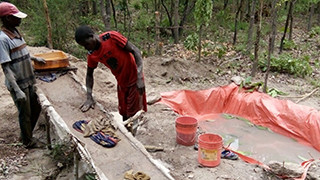Although iTSCi has helped to bring about change in mineral sourcing in the up-stream 3T supply chain in the DRC, risks are still present and issues will always occur. All stakeholders can help to identify and mitigate risks and this process is facilitated and recorded through the iTSCi incident management system. Any potential and actual risks to the supply chain which relate to Annex II of the OECD Due Diligence for Responsible Supply Chains, as well as a range of traceability and other topics such as health and safety, are all addressed through iTSCi. This process was necessary in September 2016, when state security forces (FARDC) were reported to be illegally collecting payments at the official checkpoint that they were manning close to an iTSCi mine site in Haut Lomami province, one of four new provinces created in 2016 following the division of former Katanga province.
The checkpoint was legally established, set up and approved by authorities to deter fraudulent transport of minerals, but the new provincial officials and FARDC commanders, did not seem to be aware of the legal framework for good practice. In particular, they were not aware of due diligence recommendations or how illegal taxation by state security services present a conflict related risk and a threat to the conflict free status of minerals that might have been transported past the checkpoint. To mitigate the risks in this incident, iTSCi immediately set several strategies in motion.
iTSCi immediately requested that all minerals produced at the site at the relevant time were set aside by companies, and then raised the issue with the local stakeholder committee (CLS), comprising state services, civil society, and commercial mining sector operators. The risk was also discussed directly with the provincial government, the local FARDC commander and law enforcement bodies. Following mobilisation of these stakeholders and awareness raising of military and provincial authorities, the checkpoint was promptly dismantled and illegal taxation ceased.
iTSCi continues to support FARDC in disseminating information and recommendations, has requested a letter from FARDC about their policies and sanctions against the personnel who collected the illegal fees, and is building the capacity of the provincial stakeholder committee (CPP) to manage similar risks in future. The iTSCi Katanga project manager Alain Ngandu sums up: “this incident is typical of challenges relating to poorly paid state employees, lack of knowledge about expectations of the supply chain, and deeply in-grained local practices that fall outside international good practice”. iTSCi continues to manage these challenges through good communication with FARDC, and the CPP stakeholder group, but in cases such as this is hampered by the still awaited guidance from the international community on procedures for handling minerals that have been affected by such issues.

Miners working at an iTSCi mine close to the FARDC checkpoint in Haut Lomami [Photo: Pact]
